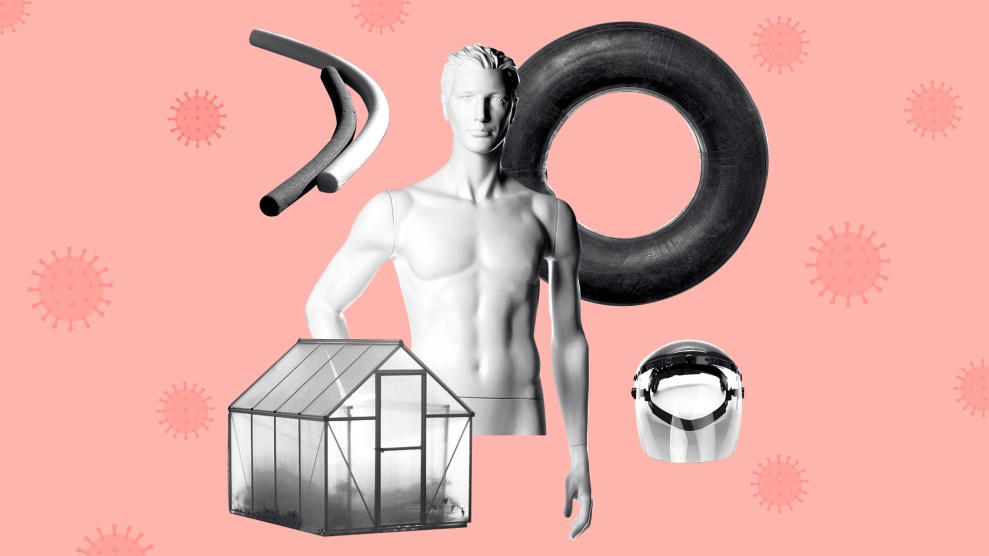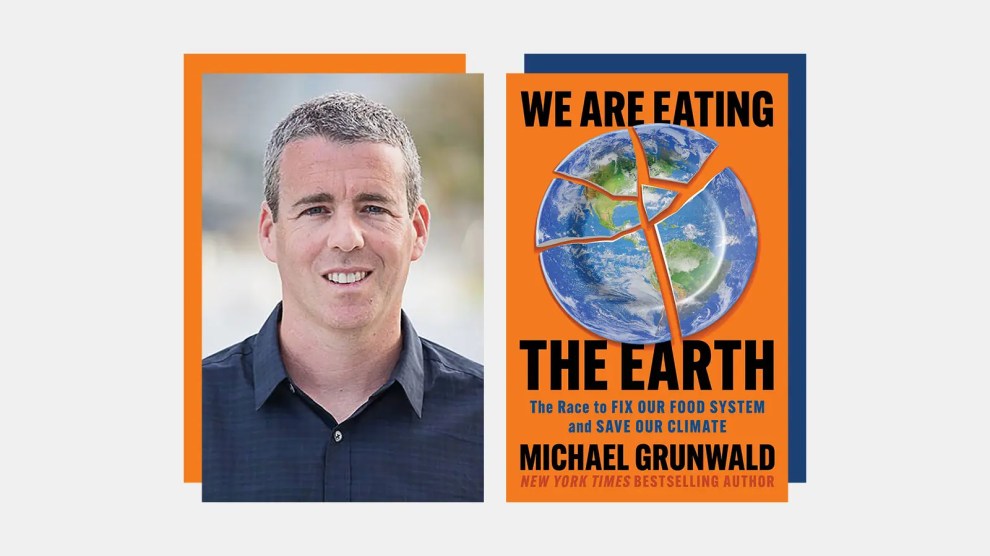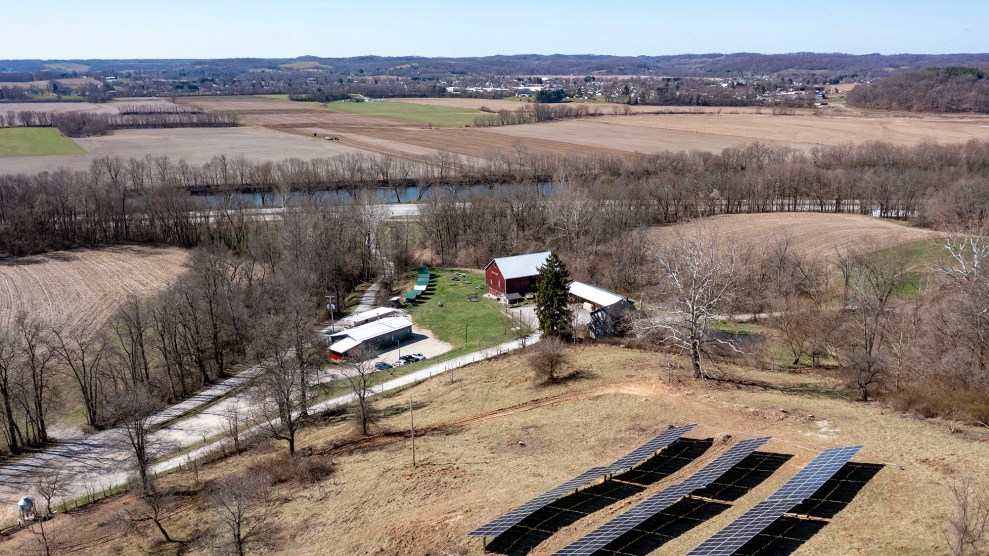
Mother Jones illustration; Getty
Restaurants face a very long road ahead. “Because of social distancing, we are going to be impacted a lot more than other small businesses,” chef and Top Chef judge Tom Colicchio recently told my colleague Tom Philpott on Bite podcast. He continued:
And on top of that, who is going to go out to dinner where the bartenders and the servers are wearing face masks? And God forbid, even with social distancing, if you take out half your seats, if someone at a table coughs, do you clear out the entire restaurant? I don’t think the question is when we can open, I think the question is when do people feel comfortable going out in crowds, and I think that’s when we get a vaccine.
Even without a vaccine, restaurants in some states and countries are starting to reopen for dine-in service. And they are experimenting with creative ways to honor social distancing—some more appetizing than others:
Shower Curtains
A breakfast cafe called the Twisted Citrus in North Canton, Ohio, has installed shower curtains between tables in preparation for the state’s reopening of dine-in restaurants. “We can spray (the curtains) down with Lysol and COVID cleaner spray,” co-owner Kim Shapiro told the Akron Beacon Journal.
An unusual social-distancing solution already is in place at the North Canton breakfast cafe Twisted Citrus. They're using clear shower-cutain liners to separate tables. https://t.co/pBxtsGy02p
— Akron Beacon Journal (@beaconjournal) May 8, 2020
The Twisted Citrus seems absolutely delightful, actually. The cafe’s website shows bright orange placemats and cheery yellow booths, and the menu includes whimsical offerings like pancake tacos and a breakfast banana split. But do you want to eat your cannoli French toast, which frankly looks divine, behind a recently sanitized shower liner? Personally, I would stick with takeout.
Mannequins
The Inn at Little Washington in Rappahannock County, Virginia, is the kind of upscale restaurant that uses the word “amuse-bouche” on the menu unironically and charges $248 $315 for a tasting menu. “Embellished to the last inch, the dining room resembles a jewelry box lined with patterned carpets, lush wallpaper, heavy drapes and bejeweled upholstery,” croons the Michelin Guide, which gave it three stars.
James Beard–award winning chef Patrick O’Connell, who majored in drama in college, wants the restaurant to still feel full with social distancing requirements. So he’s filling the empty tables with mannequins. Washingtonian reports that servers will be instructed to pour wine for and make conversation with the mannequins, which will don 1940s-era costumes and masks bearing the features of Marilyn Monroe and George Washington. According to DC Eater, the inn has contracted with an Arlington theater company to build the “sets.”
The Inn at Little Washington is using mannequins to make its socially distanced dining room feel full. No, not creepy at all. https://t.co/1LeAIrpSSO pic.twitter.com/YdE6Nur07J
— Jessica Sidman (@jsidman) May 12, 2020
Meet your dining companions… pic.twitter.com/J9ezrmgHx6
— Jessica Sidman (@jsidman) May 12, 2020
If you are freaked out, disturbed, or terrified in any way during your visit to the Inn at Little Washington, please be advised that you probably cannot call for help. According to the inn’s website: “We are located in a very rural area of Virginia, and as beautiful as it is, we have very limited cell phone coverage within a 30 mile radius of The Inn. Unless you are with Sprint, you probably will not have a cell phone signal.”
This is definitely, absolutely not the beginning of the plot to a horror movie. Please enjoy your amuse-bouche.
Pool Noodles
The Cafe & Konditorei Rothe, a pastry shop and open air cafe on the main square of Schwerin, Germany, partnered with a local TV station to provide pool-noodle hats for guests as a gimmick on the day of its reopening.
It was a publicity stunt, not intended as a lasting solution. But could these actually be effective for keeping people apart? The longest pool noodles measure about six feet, which should make them a reasonable metric for social distancing. Except that if the pool noodle is balanced on the middle of your head, that means it’s sticking out for only about three feet in either direction.
But there’s something else going on in this German cafe. This public square is a pedestrian zone with no cars allowed, so the cafe has room to space out its tables outside. And studies increasingly show that the coronavirus is much less likely to spread in outdoor settings.
Al fresco dining is going to be the summer’s hottest trend. But let’s hope the pool noodle hats are not.
Bumper Tables
In Ocean City, Maryland, a waterfront restaurant has unveiled tables shaped like inner tubes. “It’s like a bumper boat, but it’s actually a table,” Fish Tales owner Shawn Harmon told the Salisbury Daily Times. Each customer will stand in the middle of a table on wheels, which they can bump up against each other at a safe distance. It’s a fitting concept for a seaside pub that in normal times has a pirate ship playground and tiki boat rentals. The rubber barriers around the tables should keep customers socializing at a six-feet distance—until they stretch across their inner tubes to clink their glasses together.
Bumper Tables could be the answer to going to back to restaurants when they reopen — and maintain social distancing — https://t.co/c5au1HjJSJ pic.twitter.com/UqjI0EHTsd
— WBAL-TV 11 Baltimore (@wbaltv11) May 19, 2020
Greenhouses
In Amsterdam, a sustainable restaurant with its own aquaponic greenhouse is now creating miniature greenhouses for customers. The Mediamatic restaurant, which serves vegan pizza and locally caught fish, drew its inspiration for the greenhouses from the French concept of the chambre séparée, or separated room. “It suggests a sexy kind of intimacy, here things can happen that should remain hidden from plain sight and not be heard by all,” Mediamatic writes on its website. “Although what happens inside will be a lot more public…”
In the soft opening for the greenhouses, servers wearing black gloves and 3D-printed face shields presented the meals on long wooden boards.
As an arts center that specializes in design and science with a focus on “challeng[ing] the senses and tackl[ing] perceptions regarding food, waste and unconventional materials such as piss, bacteria and fungi,” may have a creative advantage when it comes to reengineering dining from a scientific perspective. One of its art installations, called “Pure Gold,” invites guests to provide “kindly donated urine,” which is then used as fertilizer in the aquaponic greenhouse.
Capybaras
When in doubt…stuffed capybaras?
The cafe at Izu Shaboten Zoo in Shizuoka, Japan uses stuffed Capybaras to enforce social distancing
(Photos by @chacha0rca) pic.twitter.com/g15HTL2IG0
— Spoon & Tamago (@Johnny_suputama) May 21, 2020













